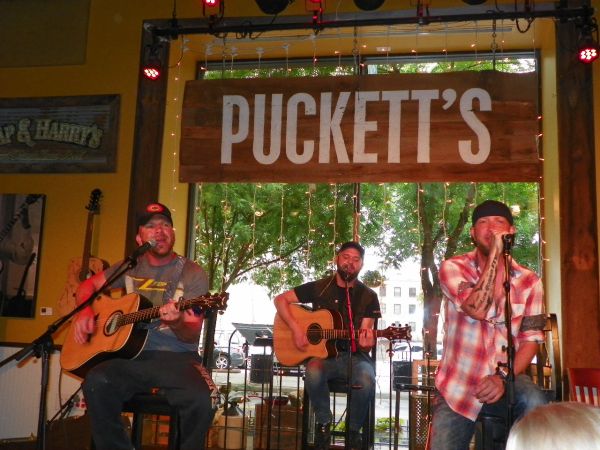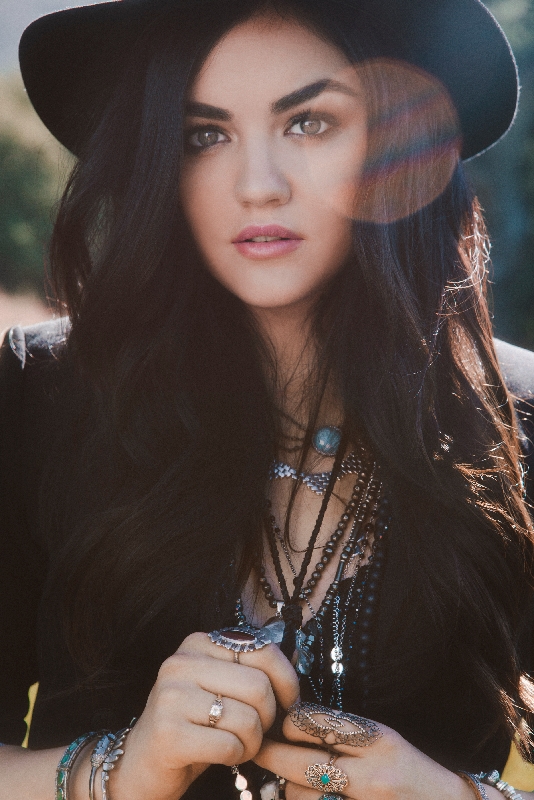LRM Interview at CRS 2014 – Dakota Bradley: "It’s all about the live shows and it’s all about the fans."
10 years ago Liv Carter Comments Off on LRM Interview at CRS 2014 – Dakota Bradley: "It’s all about the live shows and it’s all about the fans."

One of the young talents on the Streamsound Records roster, Dakota Bradley, is working hard on building his career. He’s not only working hard, but smart as well. With some high-profile co-writes already behind him, he is getting embedded in the Nashville songwriters community, while at the same time developing his own material with the help of producer Byron Gallimore and Tim McGraw. At CRS, we discussed current single, ‘Wild Child,’ songwriting, working with his famous team, and developing his live show.
LRM: OK, first thing to talk about is the single Wild Child, I love it.
Dakota Bradley: Thank you.
LRM: I was talking to Preston [Brust] just a little while ago and I told him I sent the review to Byron [Gallimore], I never thought to send it to him too.
DB: That’s awesome.
LRM: What was the write like, to sit there and go “let’s explore”? Writing is a topic that I’ve talked to Preston about quite often. You don’t have to have a new idea, because there’s probably very few new ideas. You need to find a new way in, and I think that’s kind of what you guys did.
DB: Right, you don’t. That’s exactly what we did because I basically went in with Preston, and the other guy we wrote it with Jaron [Boyer], and I said that I wanted something that’s been done, because things that have been done tend to feel the best because they’re comfortable, you know what I mean? So I said “I want a song that’s rebellious, that brings people back to that time that they broke the rules, and they felt really good about doing it!” So that’s pretty much where that song came from, it’s inspired off true events of growing up in St. Louis.
LRM: I was just going to ask, what’s true in the song and what’s not?
DB: It’s definitely inspired by true events. In St. Louis when I was like 16-17, those parties all the time got broke up by the police and you’d end up running, ya know.T hat’s like the thing to do is run so there was always a few people that would stick around and take the blame, but we were always the people that ran.
LRM: Crafting a song like that, I like the comment you made, you said ‘I want to do something that’s already been done before’, and the thought that popped in my head was ‘yeah, because you already know that that is what works’.
DB: Yeah, exactly!
LRM: You don’t need to reinvent the wheel.
DB: That’s what people beat themselves up about is trying to reinvent the wheel, when really you can reinvent the wheel in a whole new way. Even though the wheel is already invented you can reinvent the wheel.
LRM: I really like ‘All Of My Tomorrows,’ the song you wrote with Colt Ford, that is on his Declaration of Independence album. Talk about that write.
DB: Yeah, writing that song, I found out I was going to be writing with Colt Ford and I’m from St. Louis so I listened to a lot of Nelly growing up. So I have a hip-hop background as well as blues and rock and country and all that. But I was sitting at home the night before the writing session and I have this guitar part. I literally just picked up my guitar and was like “I want to write something that he could rap over, and I’m going to write a chorus that I can sing,” and that’s basically how that song came together. I went in there with a guitar lick, he rapped over it, I already had the chorus written, I mean it took 25 minutes to write that song. That’s my only #1 plaque, which is pretty cool!
LRM: That is very cool!
DB: Yeah. [smiles]
LRM: It’s the only one…so far. Let’s say that.
DB: Yeah, so far. ‘Wild Child’ is next. [smiles]
LRM: The artist co-writes must be different if you go in with Jaron and PB and you go “OK, I want to write something that I’m going to sing,” or you go in with Colt and you go “we need to write something that you’re going to perform.” How does that feel for you? What switch do you flip?
DB: Yeah, I mean, I mean that day with Colt I wasn’t necessarily writing for me or for him. I just knew what he did and I knew how I could make what I do work with what he did, and I knew that something like that would come out of it. I really don’t try to write for myself or write for anybody else, it’s like I just try to get the best product that I can possibly get.
LRM: So basically you go in and write the best song you can write that day and not think about…
DB: Because if you think about other things “I want to write this song for Jason Aldean” then you start thinking about Jason Aldean songs and that just throws you. You can’t get creative when you’re thinking like that. Some people can, but I have to just be writing. ‘Wild Child’ is such an honest song because it’s like I am a wild child and I grew up being a wild child. It’s a real thing for me, so that song has a life of it’s own that none of my other songs really have, and I hope it takes everybody back to that moment when they did that, ya know?
LRM: The song you wrote with Brian [Kelley] and Tyler [Hubbard], when did you write this?
DB: I actually didn’t write that song, I was in the studio with Tim McGraw and Byron.
LRM: Oh, somebody told me that you had co-written it with them, but it’s just their song.
DB: Well, I was in the studio with Tim and he had the song, ‘Cherry Bomb,’ and he was going to record it, and he was like “man, this song is way younger, way too young for me, it’s perfect for you.” So I cut it, and it’s the best live song I think I have. It’s a Florida Georgia Line song that they wrote, so of course it’s going to be a party live song.
LRM: What was the experience for you to be able to be in a studio with Tim and Byron, with their pedigree and their experience? Is it at any point like “holy shit, I’m in the studio with that person!” or is it like “oh my God, I get to do this and I get to learn from them!” Is it intimidating or is it really exciting?
DB: You would think it would be either one of those, the first one or the second one that you said, but really it’s like “Oh My God, I can’t believe this is happening” but I can’t stay in that mind set for too long or I won’t be able to get any work done. And I can’t stay in the other thing like “oh, thank you Mr. McGraw for letting me have this opportunity.” I can’t be like that, so really I just go in there and be myself and Tim is himself. He doesn’t act like he’s some super star. He is a super star, but he’s such a cool guy that it doesn’t come off like that. That’s my favorite thing about him. I have no lack of being creative in the studio with Tim and Byron, it’s not like I lose my creativity because of their pedigree and other stuff. I’m totally star struck and I will be every time I see them for the rest of my life. Yeah, a lot of that has kind of been taken away because of the fact that he’s taken me under his arm, and I have a relationship with him which is weird, but it’ll always be like “oh my gosh, that’s Tim McGraw,” it’ll always be like that for me. Always. [smiles]
LRM: Yeah, so when he walks in in the morning with his coffee you’re still like *gasp* [smiles] DB: Yeah, every time. [smiles] It’s like, man, it’s hard to believe. Yesterday I saw a video of Tim talking, they filmed Tim in the studio just talking about me, and it’s like that is the most surreal thing ever when he’s talking about me, and just building me up to sound like I’m some great thing. It’s like…it’s crazy. [smiles]
LRM: What is something that you’ve learned from them, that you realize you might otherwise not know, like something for live or how to record?
DB: It’s nothing about music that I’ve learned from those guys. Byron and Tim, without even doing it to me they’ve made me fearless, they’ve made me be able to walk into a room and be comfortable. If Tim is Tim McGraw, he could go places all the time and be like “Ok, I’m Tim McGraw, everybody’s gonna look at me weird.” He could be totally different, but he’s such a cool guy, he handles it all so cool. That’s what they’ve taught me. Life is so precious and beautiful, you need to just take it one day at a time and not get ahead of yourself. Basically that’s what I’ve learned from them.
LRM: And like Tim in particular, is not to believe the PR. You’re not just a well-known musician, you’re a human being, and to not lose sight of that.
DB: Yeah, I’ve already had some weird stuff from the media that’s come out about me, and it’s like I wondered what that would be like when the stuff came out that’s not true.
LRM: That must be so weird.
DB: It’s weird! They just changed what I said in that newspaper, they just changed what I said. It’s like, I want to get frustrated, but I get to be in the newspaper so why even look at it negatively when it’s already over with.
LRM: And as long as it’s not something that gets anybody into trouble.
DB: Right, if it was something serious it’d be a bigger deal, but it’s like, it’s just people twisting what I say. That’s what I’m going through, sort of, it’s like not that big of a deal, ya know? But yeah, Tim’s taught me how to not let that stuff affect me.
LRM: Well you’ll be glad to know that this gets transcribed every word you say is on the page. [smiles] DB: Hey, that’s cool. [smiles]
LRM: For your live show, how do you challenge yourself to keep getting better and better live? Do you watch other artists?
DB: I do everything I can possibly do, because when it comes to live shows, you just said it perfectly, I have to challenge myself. I have a hunger for knowledge and a hunger for growth and if I don’t grown, I feel like I’m just getting pushed down a flight of stairs and I have to climb back up with broken bones. If I’m not challenging myself and every show is not getting better, then I’m not happy, and I can’t sleep at night. When I get up in Nashville, I get to the airport and I know that that night I have a show in another city. From the second I wake up, I am in the zone and I am preparing until the second I get off stage. You fly four or five or six hours, or sit on a bus for twelve hours, just for the thirty minute show or that one hour or two hour show, and that’s what it’s all about. It’s all about the live shows and it’s all about the fans. It’s cool to even say that I have fans now! [smiles]
LRM: Does it feel different to you psychologically to go play your own show to say 1,500 to 2,000 people, or you go open for Tim and there is this sea of people?
DB: It’s so much different.
LRM: Psychologically, what’s the hurdle you have to climb over to not crumble in front of all those people?
DB: So, when it’s my shows I try to get really intimate with the people, in the sense that I look them in the eyes. I’ll explain the song and really tell them what every song is about, and how I came to the song. My shows are still high-energy, but really intimate too I guess. In a stadium show, my only goal is to…basically it’s hard to explain… I heard the lead singer from Green Day explain it really well. When you’re in a stadium show, your job is not to be intimate with every single person in the crowd, your job is to without even trying to connect with the person in the very back. My job is just to connect, and to leave smoke on the stage as I leave because I’m on fire. It’s my passion, I just live for it!
LRM: I can tell just talking to you. [smiles] I can see why Byron wants to work with you. It’s people who are totally committed, totally focused and very talented in the first place. But then, you can be as talented as you want to be, if you don’t have that work ethic…
DB: My dad dug holes for a living every day, and came home with a smile on his face, so that’s where I get my work ethic. [smiles]
LRM: Oh, I like that. That’s a good place to end it. [smiles]
&nsbp;
Liv Carter
She holds several certificates from Berklee College of Music, and a certificate in Positive Psychology from UC Berkeley.
Her main influences are coffee, cats, and Alexander Hamilton.
Latest posts by Liv Carter (see all)
- Well yes, racism, but it’s more complicated - February 13, 2017
- Black River Entertainment had a great reason to party! - October 25, 2016
- Keith Urban returns to the States for US arena leg of his “ripCORD WORLD TOUR 2016” - October 10, 2016



